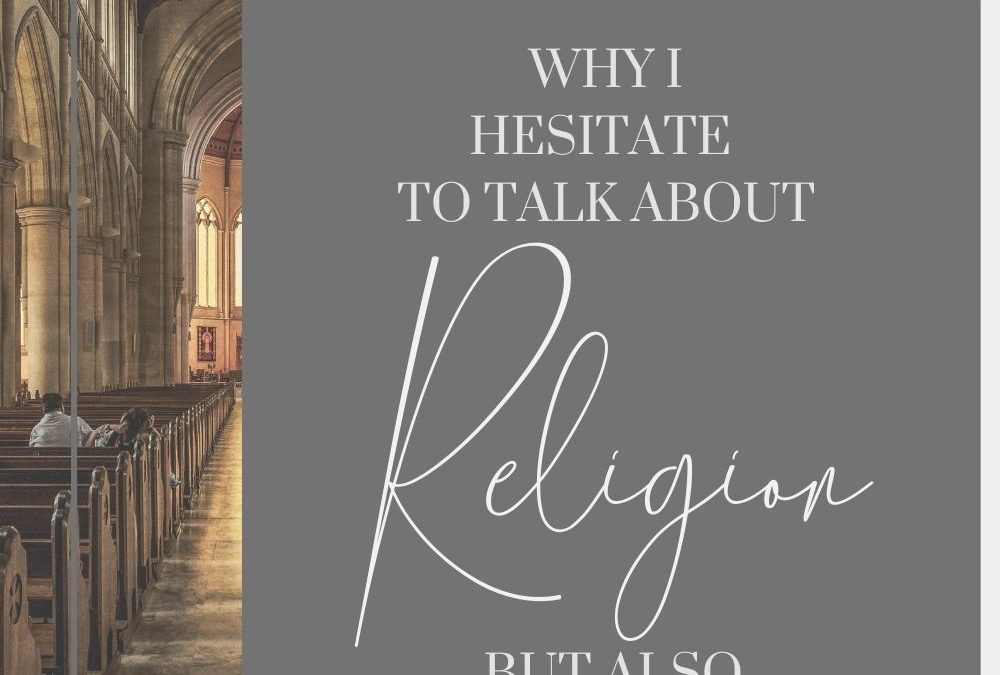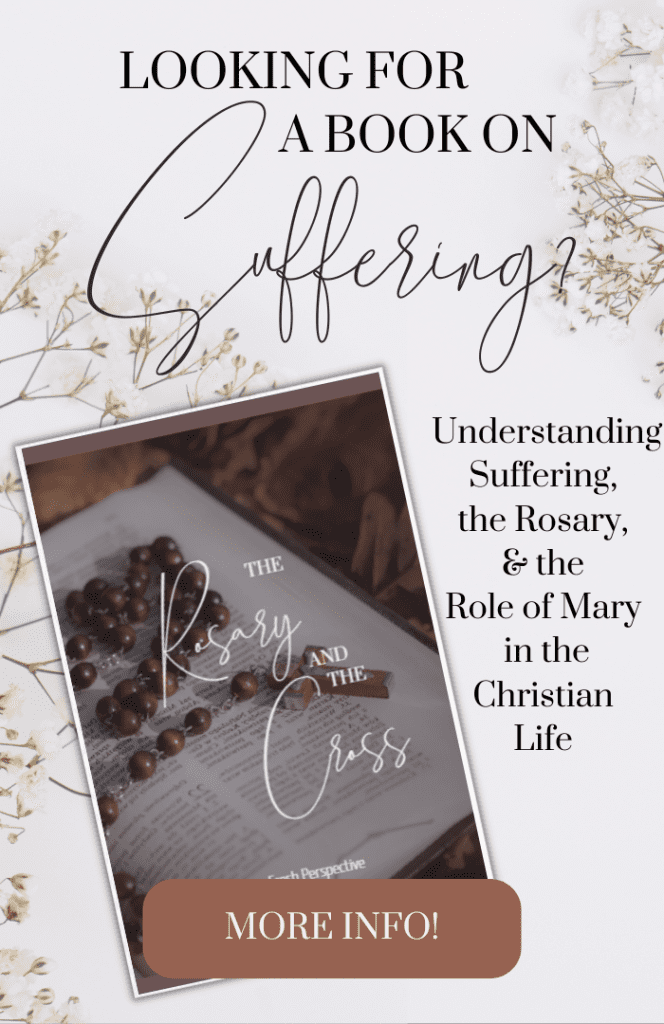I almost titled this post, “What’s Religion got to do with it?”, but the other title was better for SEO 🙂 Nevertheless, the question still stands. More and more and more people are dropping by the hour into believing that it it doesn’t have much to do with anything – mostly just “personal preference” on how one acknowledges belief in a higher power… not much else. That’s why which Religion you join “doesn’t really matter”.
Or does it?
There’s a Facebook post I saw recently – “Those who say religion has all the answers hasn’t tried one of these [picture of a host] with jam and brie”. As a Catholic, I was mortally horrified by this, of course, but, as a person, I felt some compassion for their cynicism. They’ve been fed the line that ‘Religion has all the answers’, and that, especially Catholicism – as the “Church Jesus founded” and with an “infallible Pope” – should be blindly embraced with all soul, heart, mind, and strength – and, often, longing as they are for truth, people do.
However,
many of those same well-meaning Christians have come into the church or been brought up in it since birth and found it still lacking – they’ve found it presents them with lists of rules and regulations – standards by which Christ lived and “called all of us to live” (of course) – but no means by which to live them!
“You must live the 10 commandments in great detail but we have endless Confession for you when you fail! (Because you’re only human and you’re going to fail) Have compassion on yourself. Be patient and try again.”
Where is all the “Grace” supposedly promised through the Mass and Sacraments – and even in the hours of recommended prayers I do because my religion told me I should?

With this outlook, Religion becomes impossibly demanding and with no reward except the promise of “heaven” – if you manage to die having been to Confession recently enough. The talk about loving God, and being humble, and having the truth, and even the pretty line about the Eucharist being the being the “source and summit” of our divine life, all sound lovely from the outset – but, after a while, “reality sets in.”
How does one possibly manage to survive today’s modern lifestyle with the added “burden” of all these extra prayers and events?
I “do” ministry because people said “ministry would help” – plus, *interior mental check* there seem to be some happy Catholics in ministry (right?) – but, even that begins to feel like a burden (and embarrassingly quickly, I might add – I probably shouldn’t tell anyone I’m struggling here. This is supposed to be good for me.) How can I possibly keep doing all of this that everyone says is the answer – “the solution to all my problems” – and still make a living, spend time with my family, and practice self-care?
Maybe the Catholic Church is archaic and out of touch with reality?
Maybe the solution is for her to modernize, to be more understanding or accepting of the fact that times have changed. Maybe the Mass would be more valuable to me if I just paired Jesus with some cheese and jam so that He could be more filling and I could check an actual meal off my to-do list when I go to Mass in addition to fulfilling my “Sunday obligation”. After all, I want to go to heaven where everything will finally be all sunshine and roses – basically this life with all the pleasures enhanced and all the pain eliminated. I mean, that’s the promise, right?!
If I check all the boxes, I go to heaven.
After all, they “have the truth” and that’s what they said. As long as I “do my best” to be a good person and surrender the rest to “divine mercy” – I’ve got it made in the shade because God understands that we are “only human” and He loves us, so, yeah, why wouldn’t He save us? (As long as I didn’t do something really terrible like shoot up a school, rob a bank, or do drugs – I’m fine!)
And, speaking of fine, while they’re at it [this whole ‘reform’ thing] why don’t they just do away with the ‘medieval’ standards of living and be more ‘accepting’ of people’s reality as fallen creatures and approach them from a place of more understanding and compassion. Maybe the “grace” from more convenience of access will make them stronger and better people. Maybe making the Mass more interactive, entertaining, and more like a Bible study people will find it more attractive and that will draw the crowds back?
But what do we have instead? What is the actual reality?
A mass Exodus. People giving up, and losing faith. Switching to more exciting Mega-churches with better bands because it’s more motivational and lingering than my great Aunt Martha trying to carry the dying congregation on her slightly off tune guitar.
But, I go because it’s the “right thing to do”.
Possibly, if I’m especially fervent, I move to a parish that isn’t quite as dead yet, pat myself on the back for being “heroically religious”, and judge everyone else for walking away when I’ve been “so faithful”.
We’ve entered a “God will understand” culture.
He knows me, He loves me, He died for my sins. I’m called to a simple life – make a living, give some money to the collection, and love my family (after all, that’s what Mother Teresa said, right?) – That is plenty good enough! If I’m especially heroic one day I might throw myself into ministry (when “God gives me” the time and energy) and hope that extra oomph and decidedly added discomfort will increase my ‘merit’ and I will become a “Saint”.
And, speaking of saints, I only want to think about the modern, hip, cool, “relatable” ones. The church isn’t meant to be a museum of dead people but a hospital for living ones, right? All that stuff our grandparents practiced is basically irrelevant anymore to these “changing times”.
Is this all there is?
At worst we’ve all been brainwashed and we should flee in horror. At best, we look on sadly at a past that is no longer, and a future that “religion hasn’t learned to cope with” yet.

– BUT, There IS More –
More that we don’t know about! (If you do know, count yourself extremely fortunate because you are in an elite few)
Based on exactly all the above concerns, nearly 70 years ago (1962-1965) the Catholic Church attempted a “reform” to make the “archaic” Mass “more approachable to modern man” in the hopes that people would “get more out of it” and be able to participate “more fully”.*
*(Note* – My quotes here are paraphrases, not exact wording – the quotations are used solely to explain the intent of the “reformers” – or so they lead us to believe)
Sounds like a good thing, right?
Let’s simplify it all down to the bare essentials and make everything obvious so that no one need question, doubt, nor be distracted any longer. (Not to mention, while we’re at it, we can make it some changes that will also make the Mass “more acceptable” to our “separated brethren”, the protestants, by a few more drastic changes*. No one will notice those, if we do them while we’re doing the rest of it, right?) (*A whole different article for another day)
The Problem is…
The problem was, reducing the Mass to its barest essentials wasn’t the only thing that got reduced. Since the Mass is the source and summit of the Christian life. They reduced the Christian life to the source and summit! It’s as if the Mass were the snow-capped, tippy top peak of Everest and they said, Let’s just get rid of the entire mountain and only keep the summit.
Ok, they concede, we still need a couple steps for it to still be a ‘summit’ so we’ll keep the 10 commandments, the sacraments, and some minor fasting and almsgiving during Lent as a nod to tradition but, that’s pretty much all we’ll need.
Look! Now everyone can climb Mount Everest! Let’s sell tickets!
If you remove the mountain not only do you remove the appeal and the triumph, you remove the entire means and purpose of the climb!
Yes, the goal is still the summit, but you’ve stripped the summit of everything it meant. If you reduce Religion to rules and mercy you reduce the human purpose of existence to nothing. Without grace, you call mankind pathetic, futile, and “loved” all in the same breath, and how do you think human beings are going to react to that!? Besides that’s not the message of the gospel at all! (OK, sort of, if you want to be punative about it) But more so, I believe a more appropriate word would be that mankind is DESIRED, ARDENTLY DESIRED.

Our God came to die on a cross for love of us because He wanted to make it possible for us to be with Him again. His death did not remove from us our free will that we must still exercise to choose Him or not choose Him, and make us all automatically “saved”. He did not come to abolish the law or the prophets (Matthew 5:17). He did not come to say that no more does God’s Justice or the 10 commandments matter, but rather to fulfill them and make them possible! But, He did not come to remove the entire mountain which would make the summit totally pointless.
When the disciples heard this, they were greatly astonished and asked, “Who then can be saved?” Jesus looked at them and said, “With man this is impossible, but with God all things are possible.” – Matthew 19:26

If the summit isn’t on top of a mountain, what does it matter that you go there?
If Mount Everest were reduced to a foothill everyone could climb there every day, but there would be no badge of honor, no distinction, no major appeal, no training program, no lifestyle, nothing to make it worth doing over any other pursuit in your life.
But that is not what Religion was made for.
That is not what our Lord intended.
Religion isn’t the summit at all, it is the means to reach the summit.
The summit is Heaven! The summit is God himself! Knowledge of Him, understanding, appreciation, and even Union with the God who desires closeness with us to the point that He was willing to die every death to prove it to us.
So let’s go back to the original question! What’s religion got to do with it?
First of all, what’s “it”?
Life.
‘It’ is life! Existence, purpose, meaning, etc. All of it! Anything that makes sense of why we’re here.
The answer is everything!
Religion has EVERYTHING to do with it!
The purpose of this life is to ascend the mountain of God – to get close to Him, to desire Him as he desires us, to pursue Him, to seek Him, and love Him with all our heart, soul, mind, and strength. (Matthew 6:33, John 15:4, Acts 17:27, Jeremiah 29:13, Psalm 14:2, Matthew 13:44-46, Matthew 22:37, Deuteronomy 6:5, etc)
Religion is supposed to be our toolbox and our training ground, our guide and our signposts. It’s meant to be the life-saving warnings of steep cliffs to the left, versus the arrows indicating towards the steep rock staircase with rope railing to the right. It may offer us the proper gear for protection against storms and frostbite, but we still have to make the climb.
Now, understanding the Mass and the Eucharist as the source and summit of Religion makes sense again.
It is here we meet God in His Holy of Holies – where He unveils himself to us and ever draws us nearer Him.
It is the summit because it gives meaning and purpose and destination to our climb – but, also, once we understand it and love it and see it for what it is meant to be, the intensity of joy and meaning and fulfillment that result from such an experience fill us to bursting and overflowing. This, in turn, propels us outward to share the incredible news with the entire world
Go out into the whole world and preach the Gospel to every creature. – Mark 16:15
In this way, we become the guides for the next generation of climbers – and, hence we recognize the Mass as the source of our Faith.
Staying with our analogy, there is still another problem with the ‘reform’
If we remove the summit from mount Everest and place those top 20′-50′, somewhere on comfortable, flat ground to make it more “accessible”, not only do you ruin the appeal of the summit even if you didn’t technically change the reality (though an argument could be made for that – yet another article for another time) you still have the base of Mount Everest (life), and people are still trying to climb it (duh) – only this time it is minus the summit and minus the guides and the signposts!
Even if people do manage to make it to the top by their own ingenuity – the summit that used to give purpose to the entire venture is gone and you are left with something incredible, now damaged and incomplete, while all the “guides” have turned into salesman for the “summit tourist attraction” down on the flats.
Before, the Christian life properly understood was a pursuit of Passion and intensity, cooperation with Grace, danger, and excitement. Yes, your nose still got cold and storms threatened to blow you off the face of the mountain, but at least our muscles were strong, our gear sure, and the summit was still at the top – the promised reward in its rightful place.
Honestly, this is why I hesitate to talk about Religion.
I am Catholic, but I am not what you may think of as Catholic today. When I took the leap to go to what I saw as the “fancy pants, holier-than-thou, veil-wearing, belligerent, divisive, dead-language speaking, confusing-as-all-get-out, impossible to participate, dreadfully long” Mass, I felt like a traitor to my parish, to my priest, and to the people who had loved us and welcomed us into their hearts and homes when we moved here with nothing and no one else.
I only went because my husband wanted to try it out. (God knew I needed a push to get me where he needed me, because I NEVER would have gone without it.) and, to be perfectly honest, I really didn’t like it at all. It was “boring” and “different” than what I was used to. It was only after going for about 2 months and stopped analyzing the external trappings like a tourist so much that I began to notice that deep inside, my soul was opening up. Something deep within me was at peace, and an “uncomfortable”, but nevertheless very serious conviction was growing in my soul.
It was only “a new parish” but I felt like I switched religions.
Gradually, all the ‘mysterious’ things I loved about being Catholic but never understood before made sense. There was so much more richness, depth, purpose, meaning, and solemnity. All the “bells and whistles” I had disparaged before were showing me new layers of meaning, and the celebrating of feasts cast aside as unimportant in the new calendar all of a sudden made the important ones even more meaningful. New understanding shocked me daily with its intensity and its splendor as the scales began to fall from my eyes.
It wasn’t like a party celebrating the new and improved accessibility to the summit, but rather a team of climbers gearing up to make this journey alongside one another. Smiling, excited, expectant, in shape, alive, purpose driven, and hopeful. In addition, almost without my even realizing it, the level of my relationships with other people skyrocketed – a shy and awkward loner before, now I saw that there were indeed other people who wanted what I wanted and wanted to do it with me! My husband came out of his shell and voluntarily spoke to other human beings! My kids had friends! The Traditional Mass was teeming with young families who understand marriage and parenthood (or at least live their faith enough to remain pro-life).
Now this is the other reason I’m hesitant to talk about Religion
Because not everyone, even if they are Traditional Catholics, understand their faith, or live it in the truly authentic lifestyle way it is meant to be lived. But, truly, it’s not always their fault. The lack of good guides since the destruction of tradition is abysmal (You must consider that were intentionally silenced after the “reformation”, and none have been trained since.) But, to be perfectly honest, the problem began long before that. The whole reason “reformation” happened at all was because already somehow we had forgotten the beauty of what we had, and lost our understanding of how to live it.
This is why it is so critical to remind ourselves always that religion is not equal to the people in it.

When the true religion is full of hypocritical and clearly confused wanderers it makes people believe that the Religion is at fault – they need to place the blame somewhere, after all – So, good people stay away.
Logical enough.
Often a group of well-intentioned, serious “climbers” (our Protestant brethren), who still want to find a way up the real mountain, will get together to encourage each other on the way – they figure they can conquer it together by simply inventing a new brand of gear, and I commend them, I admire them, and I love them. Their work is challenging, their progress inspiring, and their enthusiasm admirable. But the summit is still missing. Chopped off the top of the mountain to make it more accessible to the people who don’t feel like climbing.
We have to do something about this!
The Church has long been predicting, praying for, and awaiting a “new springtime”. Maybe this is it. A new shoot is budding forth from the base to replace the dying stalk.
Maybe Tradition at the time of Vatican II had become too habitualized, too taken for granted. The meaning lost in the mundane. We thought “reform” would be the answer, but what we have now is the opportunity to realize the beauty of what we lost.
We thought reducing religion to the bare minimal would make it more a more practical compliment to “regular [modern] life”, but, it turns out, people don’t want something more to do on top of normal life. Instead, we need something that fuels our life, explains it, and gives it back meaning and purpose.
We must put the Summit back at the top of the mountain.
It will change our lives!
—————————————————
A couple final notes
I woke up at 2am and passionately wrote this article as a feverish stream of consciousness that would not allow me to rest. It is not meant to be a scholarly dissertation on Vatican II or the subsequent consilium (hence the paraphrases and lack of direct quotations), nor is it meant to say that the practice of Catholicism before the Council was perfect. Quite the opposite. I think the problems go much deeper and that the external way Catholics are/were practicing their faith at any point in History is merely a symptom of their understanding/internalization of the purpose of Religion in the first place.
It’s about God!
I only share this article here because I believe that THIS is what the world is aching and dying for. We MUST revolutionize our understanding of the purpose of Religion as a journey toward closeness with Him rather than a battle reminiscent of political partisanship. Only this understanding explains sin, grace, free will, the purpose of having a triune God, Mary, and even the Saints (more articles for other moments), not to mention the external “trappings”, in a way that connects with our HEARTS, rather than just our heads.
For more scholarly information on what happened in the actual post Vatican II “reforms” you may want to consider exploring Latinmass.com.
I have a feeling there will be much more to come on this topic so stay tuned.
[mailerlite_form form_id=1]



